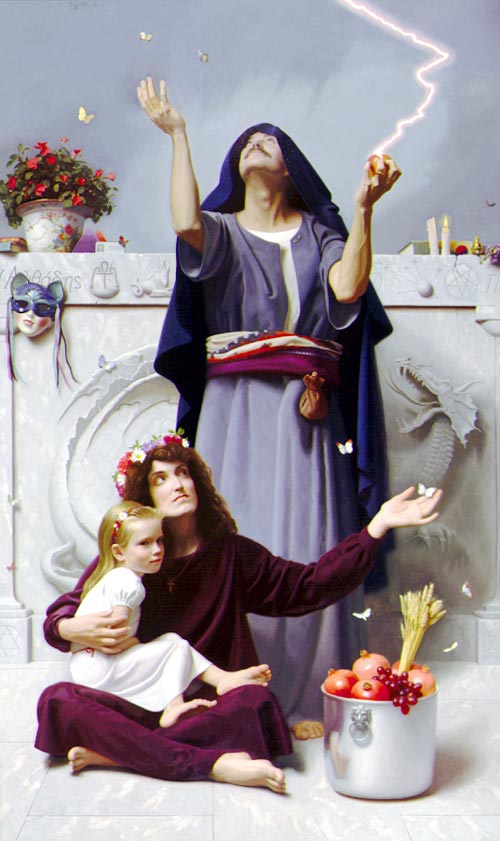|
|

|
Image
© Stephen Gjertson
Scan © Gandy Gallery |
| The mask represents psychology when it leads people away from God toward counterfeit spirituality. Behind it is carved authades, the Greek word meaning self-absorbed or self-willed. To the right of the mask is the Egyptian hieroglyph for "all" beneath the signs of "life" (ankh) and "dominion." The ancient zodiacal sign for Taurus, the Bull, is next to this. Above these, on top of the wall, are a pot of impatiens, New-Age pyramids, books by false cults and secret societies and a money card of the coming one-world economic system. The symbols continue to the right of the figure: homosexuality's inverted pyramid, the worship of sun, moon, and stars, and the Satanic pentagram, through which runs a crack in the wall signifying the ultimate destruction of sexual sin: porneia. On the wall above them is a book on Eastern religions, votive candles, incense and flowers. Flying toward the candle to its death is a moth, symbol of corruption. Hexagrams, the most powerful of occult symbols, are carved in the base of the columns. Turning from these are a husband, wife and young child. The wife is clothed in red-violet, symbolic of the mixture of humility (violet) and love (red) she shows in putting herself under the loving authority of God and her husband, both of whom she acknowledges by her open, outstretched hand. With her other hand she enfolds and nurtures her child, who is clothed in white, signifying that righteousness is imputed through childlike trust in the gospel of Christ. The flowers in their hair are symbols of purity (white), humility (violet) and love (red). The husband's relaxed, right hand (of fellowship) is raised in praise to God and represents his new nature. His flexed left hand, representing his old, sinful nature, is clenched around an apple, the painting's most significant symbol. The apple personifies Adam, through whom sin entered the world, and Christ, through Whom righteousness entered the world. The lightning of God's judgment falls upon Adam (and through him humankind) and upon Christ, Who became sin in behalf of Adam's descendants who would believe in Him. The silver container represents the Word of God. The lion is Christ, to Whom it bears witness. Pomegranates are a symbol of the church, its many sins (seeds) covered by the blood of Christ (red skin). The grain and grapes are traditional symbols of communion. Butterflies, symbolic of metamorphosis or permanent change, represent the reality of resurrection and eternal life in Christ that has overcome the sin and death of this present world. |